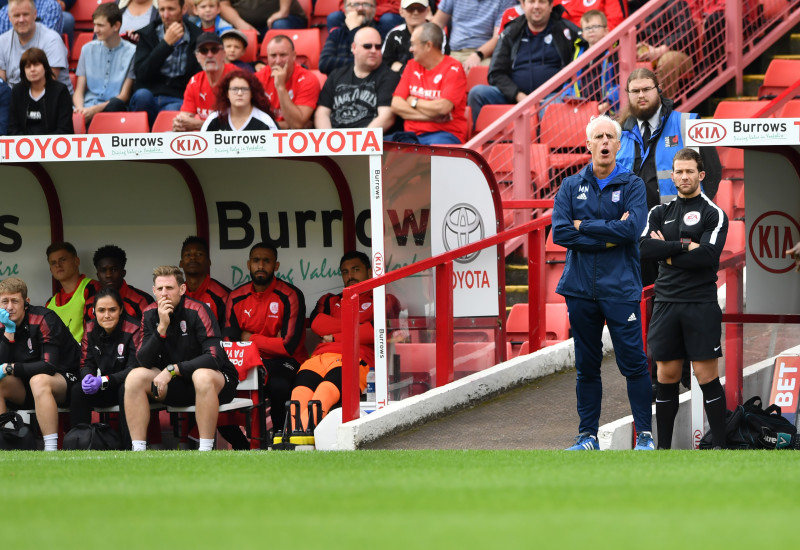Mick McCarthy has played and managed at World Cups, won league titles and is close to 1,000 games as manager after more than 500 as a player during a 43-year career in professional football.
But losing a 2-0 lead at Grimsby Town in 1982 with his hometown club Barnsley still haunts him almost four decades later. The Reds – under the late, great Norman Hunter – were riding high in Division Two towards the end of the 1981/82 season and chasing a second successive promotion, and a third in four years, which would have put them in the top flight for the first time in their history.
But a side containing McCarthy as well as other Oakwell legends such as Ronnie Glavin, Ian Banks and Trevor Aylott lost the Good Friday game 3-2 at Blundell Park. A month later, they finished four points outside the three promotion places in sixth place – five years before play-offs were introduced.
“That game rankles with me still,” says McCarthy, who played 272 games for his hometown club from 1977 to 1983 and gained two promotions.
“I struggle to remember games I have won, but games that have cost me throughout my career, I remember them vividly. “Grimsby had players like Kevin Moore and Joe Waters. They had Nigel Batch in goal and the Barnsley fans used to sing a good song about him.
“We were 2-0 up and wiping the floor with them then we threw it away in the second half. It was Easter, so late in the season and we were really pushing for promotion but that was a real kick in the guts. It completely pulled the plug on us and we would have been promoted if we had won that.
“It would have been amazing to play in the top flight with my hometown club, having started with them in the Fourth Division just five years before. But, sadly, it wasn’t to be. That team was definitely good enough to get there but then it started to get dissected after that.”
That season also contained a remarkable run to the League Cup quarter-finals during which Barnsley beat Peterborough United, Swansea City, Brighton and Hove Albion and Manchester City before drawing 0-0 at Anfield against a Liverpool side containing Kenny Dalglish, Ian Rush, Alan Hansen, Mark Lawrenson and Bruce Grobelaar. Bob Paisley’s team won the replay 3-1 and won the cup as well as the Division One title that season.
McCarthy said: “We beat Brighton 4-1 and that gets overlooked, because they were a First Division side as well. The Man City game was very tough but a great occasion in front of a massive crowd. Trevor Francis didn’t play which helped us. Then we went to Liverpool on the foggiest night ever. We all thought the game was going to be off. All our fans were coming over Woodhead and the M62. We heard stories of some of them arriving with five or ten minutes left in the game, hearing it was 0-0 and wanting the ref to blow the whistle even though they hadn’t seen any football and their team was playing at Anfield. I always found that particularly amusing. Liverpool battered us in the second game because they were a great side.”
McCarthy had made his debut as an 18-year-old in 1977 and, after a Division Four season under Jim Iley, played for former England internationals and household names Allan Clarke then Hunter who achieved one promotion each. He said: "I followed Leeds as a boy so to play under both of them was incredible. Allan Clarke was such a big name and all I could call him was 'Allan' and not gaffer. He brought so much professionalism and completely changed the club around. The attendances shot up and we started going up the leagues. Those seasons were great, I remember the games against Grimsby and Rotherham at home when we got promotion and all the fans came onto the pitch. Fantastic moments."
Mick learned off Clarke and Hunter but Norman Rimmington, the Oakwell stalwart of more than 70 years before his death in 2016, was his biggest influence and mentor.
McCarthy said: “Rimmo is always at the front of my memory. After I left, I used to travel up to some Barnsley games just to see him. We would sit in the West Stand. He was an inspiration to me. If he said ‘well done’ to me, I felt like I had won the pools. When I was a young player, if I hadn’t done my jobs right, he would give me a dig on the arm but that’s the way it was back then. It was always done affectionately.
“I loved Rimmo. I spoke at his funeral and I was in bits as soon as I stood up. A big part of the reason my career has been the way it has, and any success I have had, is down to him and the advice he gave me. “There were a few times when I could have got in arguments with people that might have ruined my career but he was always there to give me advice and, always, he was right.”
McCarthy also praised Ian Evans who played alongside him at centre-back. He said: "Taff was a massive influence on me and I learned a lot off him. I remember he signed then came to watch us lose 7-0 at Reading (in December 1979) and he was saying 'why have I made this move?' But I'm glad he did because he was great to play with."
McCarthy eventually moved to fellow Second Division club Manchester City in 1983. He said: “It was my time to leave. I had played 272 league games for Barnsley and been Player of the Year three times. I got suspended then Larry May and Nicky Law did really well and I couldn’t get back in the team. Looking back now, I know Norman was right not to put me back in the side, because the other lads played really well and the team was on a good run, but I didn’t think so when I was an angry 24-year-old. I didn’t take kindly to it so I banged on his door and asked for a transfer.
“I know now that I was wrong to do that but I had been in the team for six years and I found it very tough to suddenly not be playing. I was coming into my peak years and knew I needed to play. Newcastle were in my ear but, out of the blue, Manchester City were given permission to talk to me. I went home in my kit, my wife Fiona thought I had been sent home. I drove over to Manchester and the rest is history. It was the right time to go, but being at Barnsley was a great grounding for me and I loved every minute of it.”
City were promoted the following season and McCarthy played in the top flight before moving to Celtic, where he won the title and two Scottish Cups, as well as French side Lyon before finishing his career at Millwall who gave him his first manager’s job. After finishing third but missing out on the Premiership in the play-offs, McCarthy was named manager of the Republic of Ireland, for whom he had made 57 appearances including at Euro 88 and the 1990 World Cup while he also captained the side. He took them to the 2002 World Cup then returned to club management with Sunderland and Wolves – both of whom he took into the Premier League – then Ipswich Town, a job he quit after a 1-0 win over Barnsley in 2018. He returned for a second spell with Ireland but stood down last month after taking them into the play-offs for the European Championships which have been pushed back until next year.
His name is often linked with the Barnsley job when it is available, but he said: “There have been two occasions when there was muted interest, but that’s as far as it went. I was still playing at Millwall and, when Mel Machin left (in 1993), I got a call to see if I would be interested but nothing more happened. I also got a call when I was the manager of Ireland, to see if I would be interested, but it went away.”
McCarthy, who has managed in 977 games, is hoping to return to a job once the coronavirus crisis is over. He said: “When this situation clears up, I would like to get back into management. You know that jobs will come up sooner or later and I am not for packing in or retiring yet. I am as hungry as ever, probably even more because I’ve not had a game since November last year when we drew with Denmark. I am ready if and when somebody wants me.”



